
The Indian independence movement was a series of historic events with the ultimate aim of ending British rule in India also known as British Raj. It lasted until 1947.

Bhikaiji Rustom Cama or simply as, Madam Cama, was one of the prominent figures in the Indian independence movement.

Shyamji Krishna Varma was an Indian revolutionary fighter, an Indian patriot, lawyer and journalist who founded the Indian Home Rule Society, India House and The Indian Sociologist in London. A graduate of Balliol College, Krishna Varma was a noted scholar in Sanskrit and other Indian languages. He pursued a brief legal career in India and served as the Divan of a number of Indian princely states in India. He had, however, differences with Crown authority, was dismissed following a supposed conspiracy of British colonial officials at Junagadh and chose to return to England. An admirer of Dayanand Saraswati's approach of cultural nationalism, and of Herbert Spencer, Krishna Varma believed in Spencer's dictum: "Resistance to aggression is not simply justified, but imperative".
The Swaraj Party, established as the Congress-Khilafat Swaraj Party, was a political party formed in India on 1 January 1923 after the Gaya annual conference in December 1922 of the National Congress, that sought greater self-government and political freedom for the Indian people from the British Raj.
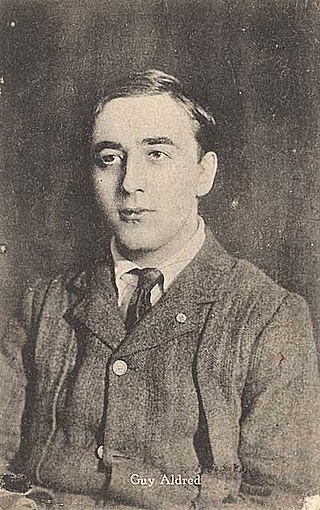
Guy Alfred Aldred was a British anarcho-communist and a prominent member of the Anti-Parliamentary Communist Federation (APCF). He founded the Bakunin Press publishing house and edited five Glasgow-based anarchist periodicals: The Herald of Revolt, The Spur, The Commune, The Council, and The Word, where he worked closely with Ethel MacDonald and his later partner Jenny Patrick.

Madan Lal Dhingra was an Indian revolutionary and a pro-independence activist. While studying in England, he assassinated William Hutt Curzon Wyllie, a British official.
The Revolutionary movement for Indian Independence was part of the Indian independence movement comprising the actions of violent underground revolutionary factions. Groups believing in armed revolution against the ruling British fall into this category, as opposed to the generally peaceful civil disobedience movement spearheaded by Mahatma Gandhi.
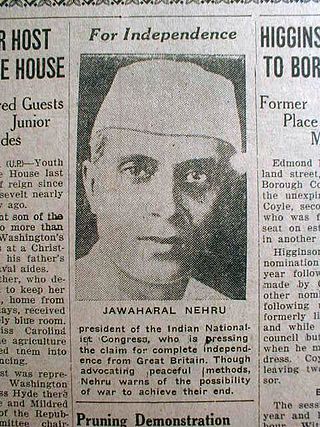
The Declaration of Purna Swaraj was a resolution which was passed in 1930 because of the dissatisfaction among the Indian masses regarding the British offer of Dominion status to India. The word Purna Swaraj was derived from Sanskrit पूर्ण (Pūrṇa) 'Complete', and स्वराज (Svarāja) 'Self-rule or Sovereignty', or Declaration of the Independence of India, it was promulgated by the Indian National Congress, resolving the Congress and Indian nationalists to fight for Purna Swaraj, or complete self-rule/total independence from the British rule
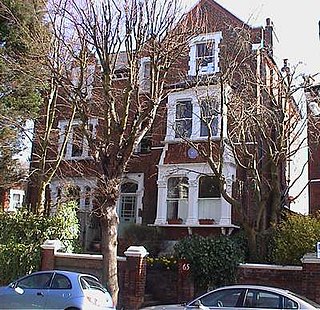
India House was a student residence that existed between 1905 and 1910 at Cromwell Avenue in Highgate, North London. With the patronage of lawyer Shyamji Krishna Varma, it was opened to promote nationalist views among Indian students in Britain. This institute used to grant scholarships to Indian youths for higher studies in England. The building rapidly became a hub for political activism, one of the most prominent for overseas revolutionary Indian nationalism. "India House" came to informally refer to the nationalist organisations that used the building at various times.

The Denshawai incident is the name given to a dispute which occurred in 1906 between British Army officers and Egyptian villagers in Denshawai, Egypt, which would later become of great significance in the nationalist and anti-colonial consciousness of the Egyptians. It is considered by some historians, such as Peter Mansfield who wrote The British in Egypt (1971), to mark a turning point in the British presence in that country. Though the incident itself was fairly small in terms of the number of casualties and injuries, the British officers' response to the incident, and the significant consequences, were what led to its lasting impact. The incident was commemorated by the establishment of the Denshway Museum.
The Berlin Committee, later known as the Indian Independence Committee after 1915, was an organisation formed in Germany in 1914 during World War I by Indian students and political activists residing in the country. The purpose of the committee was to promote the cause of Indian Independence. Initially called the Berlin–Indian Committee, the organisation was renamed the Indian Independence Committee and came to be an integral part of the Hindu–German Conspiracy. Members of the committee included Virendranath Chattopadhyaya, Chempakaraman Pillai, Dr Jnanendra Das Gupta, and Abinash Bhattacharya.
William Hutt Curzon Wyllie was a British Indian army officer, and later an official of the British Indian Government. Over a career spanning three decades, Curzon Wyllie rose to be a Lieutenant Colonel in the British Indian Army and occupied a number of administrative and diplomatic posts. He was the British resident to Nepal and the Princely state of Rajputana, and later, the political aide-de-camp to the Secretary of State for India, Lord George Hamilton. Curzon Wyllie was assassinated on 1 July 1909 in London by the Indian revolutionary Madan Lal Dhingra, who was a member of India House in London.

Mandayam Parthasarathi Tirumal Acharya was an Indian nationalist, communist and anarchist who was among the founding members of the Communist Party of India. In a long political and activist life, Acharya was at various times associated with India House in London and the Hindu-German Conspiracy during World War I when, as a key functionary of the Berlin Committee, he along with Har Dayal sought to establish the Indian Volunteer Corps with Indian prisoners of war from the battlefields of Mesopotamia and Europe. Acharya subsequently moved in 1919 after the end of the war to the Soviet Union, where he was one of the founding members of the Communist Party of India at Tashkent. However, disappointed with the Communist International, Acharya returned to Europe in the 1920s where he was involved with the League against Imperialism and subsequently was involved with the international anarchist movement.
Abhinav Bharat Society (Young India Society) was an Indian Independence secret society founded by Vinayak Damodar Savarkar and his brother Ganesh Damodar Savarkar in 1904. Initially founded at Nasik as "Mitra Mela" when Vinayak Savarkar was still a student of Fergusson College at Pune POONA, the society grew to include several hundred revolutionaries and political activists with branches in various parts of India, extending to London after Savarkar went to study law. It carried out a few assassinations of British officials, after which the Savarkar brothers were convicted and imprisoned. The society was formally disbanded in 1952.
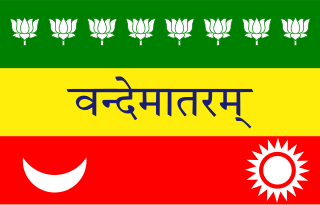
The Paris Indian Society was an Indian nationalist organisation founded in 1905 at Paris under the patronage of Madam Bhikaji Rustom Cama, Munchershah Burjorji Godrej and S. R. Rana. The organisation was opened as a branch of the Indian Home Rule Society founded that same year in London under the patronage of Shyamji Krishna Varma. The Paris Indian Society also saw active participation from Indian nationalists who at various times were associated with the India House during its short existence. This included Virendranath Chattopadhyaya, Har Dayal, M.P.T. Acharya and Vinayak Damodar Savrkar. Other prominent Indians associated with the society included P.O. Mehta, H.M. Shah, P.C. Varma and a number of other prominent Indians in Paris at the time. The Paris Indian Society, under the strong leadership of Madam Cama, developed close links with the Socialist Party and Russian socialists in exile in Paris, and Cama herself attended the Socialist Congress of the Second International at Stuttgart in 1907, where seconded by Henry Hyndman, she demanded recognition of selfrule for India. It was at this congress that Cama famously unfurled one of the first Flag of India.
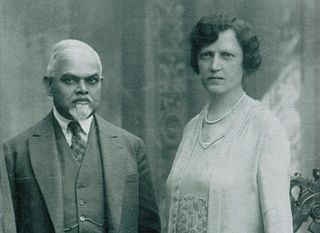
Sardarsinhji Ravaji Rana (1870–1957), often abbreviated S. R. Rana, was an Indian political activist, founding member of the Paris Indian Society and the vice-president of the Indian Home Rule Society.
Hindu nationalism has been collectively referred to as the expression of social and political thought, based on the native spiritual and cultural traditions of the Indian subcontinent. "Hindu nationalism" is a simplistic translation of हिन्दू राष्ट्रवाद. It is better described as "Hindu polity".

Vishnu Pandya is a journalist, biographer, poet, novelist, writer and political analyst from Gujarat, India. He has been the chairman of Gujarat Sahitya Akademi since 2017. Pandya writes articles on politics, history and historical places which are carried by several Gujarati newspapers and magazines, are among the most widely read columns in the State. He has been active in journalism for the last 40 years. Along with column writing in a Gujarati daily, he serves as General Secretary of Vishwa Gujarati Samaj.

Jatindra Mohan Sengupta was an Indian revolutionary against the British rule. He was arrested several times by the British police. In 1933, he died in a prison located in Ranchi, India.
Walter William Strickland, de jure 9th Baronet was an English translator and radical. He became known as the "Anarchist Baronet" because he wandered around the world for much of his life espousing radical causes. After receiving Czechoslovakian citizenship in 1923, he renounced his British citizenship and later moved to Java.














